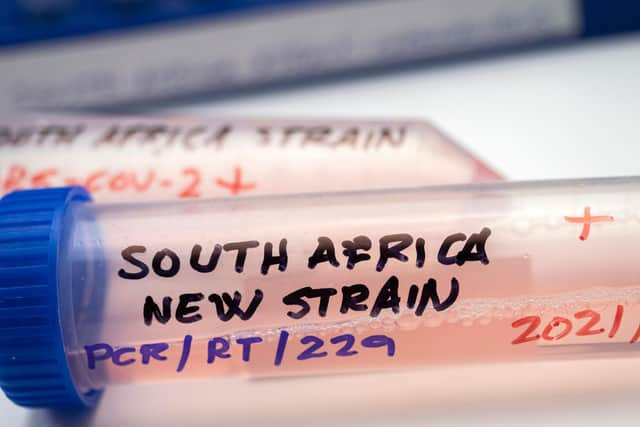Omicron in Scotland: How bad is the Omicron variant and why is it called Omicron variant
A new, heavily-mutated Covid-19 variant was detected late last week, with initial confirmed cases originating in the Gauteng province of South Africa.
Since then, there have been confirmed cases in Hong Kong, Botswana, Israel Belgium, Amsterdam, Germany, and the UK, among other.
Advertisement
Hide AdAdvertisement
Hide AdThis comes even as many countries moved quickly to lock down borders against travel from South Africa and other affected African countries.
The concern with such a markedly different variant from the original strain of Covid-19 found in Wuhan is that vaccines may not be as effective towards it.
Here’s all you need to know about Omicron and what travel rules apply.
What is the Covid-19 Omicron variant?
Initially named B.1.1.529, the latest Covid variant was named Omicron by the WHO on Friday November 26th.


The key differences that make this variant so different from previous strains are not inherently bad.
However, early tests of this variant have made it clear that it has mutated enough to potentially be less affected by vaccine.
The mutation likely came about from one patient whose immune system was unable to beat the virus.
Is the Omicron variant more deadly?


The WHO has said that it is not yet clear whether Omicron is more transmissible or if it cases more severe diseases than previous variants.
Advertisement
Hide AdAdvertisement
Hide Ad"Preliminary data suggests that there are increasing rates of hospitalisation in South Africa, but this may be due to increasing overall numbers of people becoming infected, rather than a result of specific infection," the WHO told Reuters.
Scientists have also been unable to say whether this variant is definitely more resistant to vaccines, as the vaccination rate in South Africa, where it was first identified, is 42% among adults.
A team of scientists from seven universities in South Africa is now studying the variant, with 100 whole genomes of it to test so far.
"This variant did surprise us. It has a big jump on evolution [and] many more mutations that we expected," Professor Tulio de Oliveira, the director of the Centre for Epidemic Response and Innovation in South Africa said.
Professor de Oliveira confirmed that there were 50 mutations in the latest variant, with more than 30 of these on the spike protein.
The spike protein is what most vaccines target, and therefore the reason experts are concerned this variant may be more resistant to vaccines.
Professor de Oliveira wrote on Twitter that South Africa would need support in order to fight this variant.
"The world should provide support to South Africa and Africa and not discriminate or isolate it,” he wrote. “By protecting and supporting it, we will protect the world! A plea for billionaires and financial institutions.”
Advertisement
Hide AdAdvertisement
Hide AdAn urgent meeting of G7 health ministers will be convened today to discuss the developments of the variant and how best to respond.
The South African doctor who first raised the alarm about Omicron, Dr Angelique Coetzee, told the Telegraph on Sunday that the symptoms of the variant are “so different and so mild from those I had treated before”.
These symptoms include fatigue alongside some other symptoms of Covid-19, such as fever and coughing.
Omicron in Scotland
In Scotland, there have been six cases of Omicron so far, four in Lanarkshire and two in the Greater Glasgow and Clyde area.
“This will be a worrying time for the six people now identified as having the new variant,” says Health Secretary Humza Yousaf in a statement. “All will receive expert help and support and Public Health Scotland will undertake enhanced contact tracing in all cases. This will help establish the origin of the virus and any further individuals they have come into contact with in recent weeks.”
Mr Yousaf also encouraged the Scottish public to redouble efforts to reduce the spread, continuing to wear masks, wash hands regularly, work from home where possible, and get vaccinated if you aren’t already or get a booster jab if you are offered one.
The Scottish Government has also stated that all travellers returning to Scotland from South Africa, Namibia, Lesotho, Eswatini, Zimbabwe and Botswana will be required to self-isolate in a Managed Quarantine hotel and take two PCR tests after arrival, regardless of vaccination status.
These travel measures came into place from midday on Friday November 26th.
Advertisement
Hide AdAdvertisement
Hide Ad"The decision follows concerns about cases of the emerging B.1.1.529 variant cases in the south of Africa, given concerns over a high number of mutations and the effectiveness of vaccines against it,” reads a statement on the Scottish Government website.
Why is it called Omicron variant?
Those who are familiar with the Greek alphabet will realise that the WHO passed over two letters in naming Omicron.
So far, there are five variants of concern: Omicron, Delta, Gamma, Beta, and Alpha.
There are two others, Mu and Lambda, which are not classed as variants of concern.
“Two letters were skipped —Nu and Xi — because Nu is too easily confounded with ‘new’ and XI was not used because it is a common surname and WHO best practices for naming new diseases (developed in conjunction with FAO and OIE back in 2015) suggest avoiding ‘causing offence to any cultural, social, national, regional, professional or ethnic groups’,” the WHO said in a statement.
The WHO therefore picked Omicron to avoid any issues around these problems.
Omicron Greek letter pronunciation
The WHO has named this latest variant a slightly more unusual name in comparison to Alpha and Delta that came before it.
Omicron is pronounced ‘o-muh-kron’.
Comments
Want to join the conversation? Please or to comment on this article.

